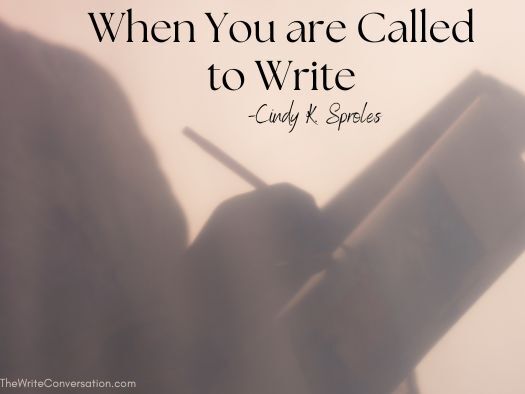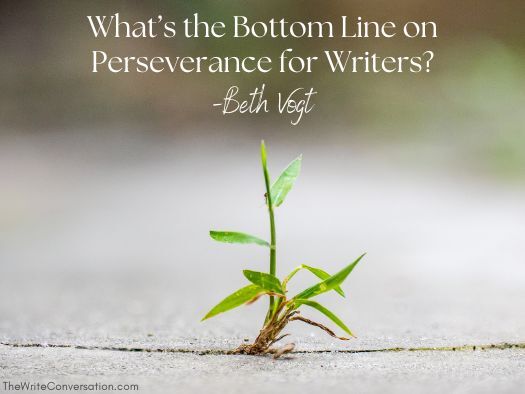Edie Melson's Blog, page 24
February 15, 2025
Things to Remember When a Writer is Struggling

by Tammy Karasek @TickledPinkTam
Here we are, barely a month and a half into the new year and into our writing plans. Sad to say, I’ve already heard from a few writer friends in the midst of a writer’s struggle in one area or another. Some struggle with time management. Others with topics or stories to do next. The one that is more prevalent this year is the good enough mindset.
This one came up time and again and in various conversations. Statements of: I don’t know if I should be writing Maybe I misunderstood God’s calling to this careerWho do I think I am to call myself a writerAnd the obvious—I’m not good enough, nobody will ever want to read the junk I write.
Can anyone of you relate to this? I so wish I could say I was free from these thoughts. Though not as strong as in years past, it’s easy to fall into the trap to question this calling, especially when we see all of the exciting posts for fellow writers getting contracts, winning contests or the ability to type the end of yet another book. Writer friends, that’s exactly where Satan would have us land, too—smack dab in the middle of self-doubt. It must be one of his favorite darts to throw at writers.
When this happens, and none of us are immune to these darts, we need to remember God was the one who called us to write. He knew our capabilities and chose us to be His personal scribes. On our own, we aren’t good enough. But He didn’t throw us into writing and expect us to do it alone. He’s there walking beside us. Or for some of us—pulling us forward. (Raising my stubborn hand over here!) Where we’re weak, he’ll bring teachers to us. We have writing friends, craft books, conferences and webinars to take our weaknesses and make them our strengths. Accept the help. Don’t flounder hidden at home.
If you are here at the present time, first reach out to the One who gifted you with this talent and called you to this endeavor. Admit your struggles and ask Him to show you the struggles you may not see, then allow Him to direct you to your next steps. Be receptive to the assistance and guidance He sends your way. He has confidence in you, you were chosen for this task of sharing His gospel through your stories. Have confidence in yourself as well.
“And whatever you do, in word or deed, do everything in the name of the Lord Jesus, giving thanks to God the Father through him.” Colossians 3:17 ESV
Next, reach out to a writer friend and ask for prayer. Don’t be afraid to ask them for suggestions or resources to help you with stumbling blocks you may have. Often you will find they are eager to encourage you to push through this time and will be a great accountability partner to hold you to kick self-doubt to the curb.
How about you? Are you a writer with struggles in your writing? If not, did you ever struggle with the self-doubt—and if so, how did you overcome that season?
TWEETABLEThings to Remember When a Writer is Struggling from @TickledPinkTam on @EdieMelson (Click to Tweet)
 Tammy Karasek uses humor and wit to bring joy and hope to every aspect in life. Her past, filled with bullying and criticism from family, drives her passion to encourage and inspire others and give them The Reason to smile. She’s gone from down and defeated to living a “Tickled Pink” life as she believes there’s always a giggle wanting to come out! A writer of Romance—with a splash of sass. She’s also The Launch Team Geek helping authors launch their books and also a Virtual Assistant for several best-selling authors. Don't miss her recent book, LAUNCH THAT BOOK, just released in November.
Tammy Karasek uses humor and wit to bring joy and hope to every aspect in life. Her past, filled with bullying and criticism from family, drives her passion to encourage and inspire others and give them The Reason to smile. She’s gone from down and defeated to living a “Tickled Pink” life as she believes there’s always a giggle wanting to come out! A writer of Romance—with a splash of sass. She’s also The Launch Team Geek helping authors launch their books and also a Virtual Assistant for several best-selling authors. Don't miss her recent book, LAUNCH THAT BOOK, just released in November. Her work was also published in a Divine Moments Compilation Book—Cool-inary Moments. She’s also the Social Media Manager for the Blue Ridge Mountains Christian Writers Conference, Founding President and current Vice-President of ACFW Upstate SC, and Founding President of Word Weavers Upstate SC. She’s a writing team member for The Write Conversation Blog, Novel Academy, MBT Monday Devotions, The Write Editing and more. Connect with Tammy at HTTPS://WWW.TAMMYKARASEK.COM.
Published on February 15, 2025 22:00
February 14, 2025
The How's and Why's of Formal Versus Informal Writing

by Edie Melson @EdieMelson
This question came from one of our community, Barbara Harper! I always appreciate questions like this because it’s easy to overlook some things and assume everyone knows what we’re talking about. Just FYI, when the issue came up, Barbara did her homework and figured out what these terms meant. But she went one step further and made sure we had the info here on The Write Conversation.
Sometimes we get told our writing is too formal or that we need to write more conversationally. That’s great feedback, but what are some specific techniques we can use and why do we need them?
Definitions
Formal writing is something you’d see in serious academic creations. Think term papers, thesis, research. It’s also something we see in the legal, medical, and engineering professions.
Formal writing often feels superior—like the writer is talking down to the ignorant reader. It can also convey a coldness that leaves readers feeling disconnected.
Informal (sometimes called conversational) writing resembles the way we talk to each other in everyday life. It’s not dumbed down, as some have accused. Instead it’s learning to speak to our audiences in ways that provide a connection.
Conversational writing works to connect with the reader and put them at ease. It avoids talking down and concentrates on engaging the reader where they are.
7 Specific Tips for Informal (Conversational) Writing
1. Avoid too many large words. The overuse of multisyllabic words require the reader to stop and look up meanings. Unfamiliar words also slow down the reading. This doesn’t mean we shouldn’t use uncommon words—only that the words should have enough context to make our meaning clear.
2. Insert personal stories. This helps our readers understand we’re writing from a place of connection, instead of just telling them what to do. Also, in the new world of AI, inserting personal stories assures search engines that person wrote the words, not artificial intelligence.
3. Avoid words that exclude. This is important for those of us who write Christian themes. There is a kind of code in those who are deeply involved in church—with phrases that have absolutely no meaning for anyone not in the clique. We call this avoiding Christianize.
4. Use plenty of conjunctions. When we talk we say don’t instead of do not , wouldn’t instead of would not , and we’re instead of we are . I have a quirk when I write—I forget to use conjunctions. I have no idea why, but I do. Since I know that, one of the first things I do when I edit is look for places to put in conjunctions. The best way I’ve found to do that is to read what I’ve written out loud. That makes me automatically replace formal writing with informal.
5. Avoid too many complex sentences. I got some excellent advice early in my writing career. “If you can say it simpler, do it.” Many writers get caught up in the beauty of the words, using too many metaphors, similes, and other techniques that cause our writing to lose focus. We should strive to vary our sentence length and style, but we should never allow our writing to be wordy.
6. Use active verbs and specific nouns. A lot of formal writing is characterized by passive voice. Keeping the tone active, keeps the reader engaged.
7. Use your voice. Every writer has a distinct voice. I could write an entire blog post on voice, but Cindy Sproles has already done an excellent job of that. To learn more about your writing voice, visit Tips to Find Your Writing Voice.
Our writing style will affect how our words are received. There is power in learning to write simply and eloquently. And remembering that those two techniques are never mutually exclusive.
Now it’s your turn. What would you add to the list? Be sure to leave your thoughts, and any questions you have, in the comments section below.
Don’t forget to join the conversation!Blessings, Edie
TWEETABLEThe How's and Why's of Formal Versus Informal Writing from @EdieMelson (Click to Tweet)
 Edie Melson is a woman of faith with ink-stained fingers observing life through the lens of her camera. No matter whether she’s talking to writers, entrepreneurs, or readers, her first advice is always “Find your voice, live your story.” As an author, blogger, and speaker she’s encouraged and challenged audiences across the country and around the world. Her numerous books reflect her passion to help others develop the strength of their God-given gifts and apply them to their lives.Connect with her on her website, through Facebook, X and on Instagram.
Edie Melson is a woman of faith with ink-stained fingers observing life through the lens of her camera. No matter whether she’s talking to writers, entrepreneurs, or readers, her first advice is always “Find your voice, live your story.” As an author, blogger, and speaker she’s encouraged and challenged audiences across the country and around the world. Her numerous books reflect her passion to help others develop the strength of their God-given gifts and apply them to their lives.Connect with her on her website, through Facebook, X and on Instagram.
Published on February 14, 2025 22:00
February 13, 2025
Pursue Your Passion

by Lilka Raphael @Lilka_Raphael
Writing is my obsession, my passion. My relationship with it is one of the most complex and agonizing and richly vexing that I have in my life—Julianna Baggott
Each new year brings with it opportunities to stretch ourselves and hone our craft. Yet if writing is your passion, this typically requires us to exhibit discipline, commit time, and develop techniques that improve our writing.
Conferences and online resources help us push through boundaries and develop our talents. There are opportunities for every skill level. Some conferences skew toward those who are new to drafting a novel or a exploring a freelance writing career. There are also advanced conferences and workshops that cater to accomplished and acclaimed writers—authors with years of publishing experience and success. Whatever your status, there are endless options that provide knowledge and insight into traditional and self-publishing. Most importantly, these resources are fertile ground for connecting with other authors, agents, and making new friends who share our interests.
Specialized workshops and courses target specific genres. They span a broad range from romance, thrillers, and killers to picture books and religious content. Online opportunities also abound. However, the time to find what you need is now. Most dates for this year’s conferences have already been set.
Not quite confident about a conference? Then consider online courses to improve your writing skills. I took one online course and was puzzled to find that some of those grammar rules drilled into me decades ago changed. If you write for a broad audience, there are current trends and social norms to consider. Some rules have been relaxed as digital content expands. Resonating with readers is increasingly more important to editors than a fixation on Old English guidelines.
If we are truly engaged in our craft, we can never learn too much about the developments in the publishing industry. Like everything else, preferences and priorities change. What we learned five years ago may now be obsolete. Staying connected and mindful of prevailing practices allows us to be intentional. We can then better identify our target audience, potential publishers, and the most effective ways to market our work.
Invest in resources that align with your goals. Consider a second look at workshops or conferences you disregarded previously. Commit to pursuing something that reignites the flame that inspired you to write. We should continually strive to expand our talents and maximize them. Our gifts aren’t for our own sake but rather to teach, nurture, and entertain others.
Be intentional. When we pursue our passion, we are eventually rewarded for our efforts.
Whoever pursues righteousness and love finds life, prosperity and honor. Proverbs 21:21 NKJV
TWEETABLEPursue Your Passions from author @Lilka_Raphael on @EdieMelson (Click to Tweet)
 A Florida native, Lilka Finley Raphael has been a licensed pharmacist for over thirty years. Her passions for writing, gardening, and photography prompted her to share her experiences and life lessons on her blogs B Is for Blessed and God, autism, & me. You can learn more about her at lilkaraphael.com
A Florida native, Lilka Finley Raphael has been a licensed pharmacist for over thirty years. Her passions for writing, gardening, and photography prompted her to share her experiences and life lessons on her blogs B Is for Blessed and God, autism, & me. You can learn more about her at lilkaraphael.comLilka’s greatest achievements are her two adult sons who have flown the nest. Happily married for thirty-two years, she lives east of Atlanta with her husband, Rod. They now share their home with two German Shepherds—Holly and Ivy—and one naughty kitty, Moxie.
Published on February 13, 2025 22:00
February 12, 2025
Inspiration for Writers from a Book

by Julie Lavender @JLavenderWrites
I recently served on two panels at a Georgia book festival. I and four other writers took turns answering writing questions, like:
“How long have you been writing?”
“How old were you when the writing bug hit?”
“How many books have you published?”
Then he asked a question that changed the dynamics of the conversation:
“Which author has influenced your writing the most?”
In the second or two of pondering, I thought of several children’s authors whom I adored from my single-digit years and a few children’s authors I’ve come to know personally after becoming a writer.
Before anyone had a chance to speak, Sonya, my new friend on the end whom I’d only known about seventeen minutes, said, “God.”
A hush fell over the room. Eyebrows raised. The moderator suddenly lost his game.
“Well, nobody wants to go after that,” I admitted. Laughter erupted as I added, “I’m so embarrassed—I wasn’t going to say God for my answer.”
I winked at Sonya. “Great answer,” I whispered.
After we recovered and giggled a little more, added an answer or two, the moderator continued.
“Most authors tend to read more than one book at a time, and within our panel here we have fiction writers, non-fiction ones, those who write for children, those who address adults mostly, general market authors, as well as faith-based writers.
“How many books are you currently reading? Tell us how many books are on your bedside table.”
My friend Jeannie said four. I answered three. Katherine said four.
You wanna know smarty-pants’ answer?
Without missing a beat, Sonya said, “Sixty-six.”
The room broke out in laughter again, and her husband—the pastor on the front row videoing his precious wife—stood up and gave her a high-five.
We giggled. We learned. We shared. We grew.
Later, I couldn’t help but think of Sonya’s answers. I’m ashamed I didn’t give God the credit due Him as spontaneously as my sweet friend did. It made me ponder those sixty-six books she referred to.
After the conference, I googled “top verses” from several books of the Bible to locate Scripture I could apply to my writing. Here are a few verses that stood out to me from Sonya’s sixty-six books, collected into the most magnificent Book ever published.
I encourage you to apply these to your writing journey and then share a few of your favorites with us in the comments.
Bible Verses for Writers
* The Lord had said to Abram, “Go from your country, your people and your father’s household to the land I will show you.” (Genesis 12:1)
This one reminds me we sometimes have to step out of our comfort zone in our writing.
* There is a time for everything, and a season for every activity under the heavens. (Ecclesiastes 3:11)
From this verse, I’m reminded of God’s perfect timing for writing acceptances and publishings.
* Trust in the Lord with all your heart and lean not on your own understanding. (Proverbs 3:5)
I’m not always going to understand rejections, but I can trust God’s plan.
* Keep your lives free from the love of money and be content with what you have, because God has said, “Never will I leave you; never will I forsake you.” Hebrews 13:5
Most writers aren’t involved in this industry for the money. Very few make top dollars. When I focus on the ministry side of my writing, I am content with payments, however small they sometimes seem.
* For the message of the cross is foolishness to those who are perishing, but to us who are being saved it is the power of God. (1 Corinthians 1:18)
Christian writers have the opportunity to dispel foolishness and share the gospel. What a joy to boast on the power of God!
* If any of you lacks wisdom, you should ask God, who gives generously to all without finding fault, and it will be given to you. (James 1:5)
Writers’ block? Ask God for wisdom and guidance.
* “And who knows but that you have come to royal position for such a time as this?” (Esther 4:14)
When I switch “royal position” with “be a writer,” I’m convinced I have the opportunity to share Christ with others through my writing “for such a time as this.”
* But be sure to fear the Lord and serve him faithfully with all your heart; consider what great things he has done for you. (1 Samuel 12:24)
I’m grateful for each writing project the Lord sends my way. I hope you’re thankful for the opportunity to be used by God for His Kingdom purposes through your writing as well.
* But as for you, be strong and do not give up, for your work will be rewarded. (2 Chronicles 15:7)
Persevere, my writer friend. Don’t give up!
* Being confident of this, that he who began a good work in you will carry it on to completion until the day of Christ Jesus. (Philippians 1:6)
If God’s called you to writing, He will carry you through to completion. You can count on that promise!
What about you? Will you share a verse that relates to your writing journey, one that holds special meaning?
TWEETABLEInspiration for Writers From a Book, @JLavenderWrites on @EdieMelson (Click to Tweet)
 Julie Lavender loves applying God’s Word to every aspect of her life, but especially likes to make connections between Scripture and her writing journey. She writes for “all seasons of life” to include kiddie lit, educational books for kids, publications for adults, faith-based pieces, general market submissions, short pieces, and books. Recently, she’s enjoyed diving into a co-authoring relationship with her husband, and the two proudly proclaim they make a pretty good team in that arena of their lives, too.
Julie Lavender loves applying God’s Word to every aspect of her life, but especially likes to make connections between Scripture and her writing journey. She writes for “all seasons of life” to include kiddie lit, educational books for kids, publications for adults, faith-based pieces, general market submissions, short pieces, and books. Recently, she’s enjoyed diving into a co-authoring relationship with her husband, and the two proudly proclaim they make a pretty good team in that arena of their lives, too.
Published on February 12, 2025 22:00
February 11, 2025
Writing Articles as a Marketing Tool

by Linda Gilden @LindaGilden
Someone on this blog a week or so ago referred to “conference season.” Yes, that’s what we call it after Christmas when the conferences crank up again to help you with your writing. You always know it is coming so as writers you can start collecting change and what I call laundry money so you will be ready to join in all the writer fun. (“Laundry money” is what falls out of pockets when I wash the clothes and since I do the laundry, I put all my laundry money in a special place to use on something I would really like to do for myself. It is usually writing related but at least I have this little “Me fund” to do something I would otherwise not get to do.)
We recently turned the calendar over from 2024 to 2025. What are the goals you have for your writing in 2025? Are they ambitious or are you happily stuck in a place where you can just continue as you are?
I would like to suggest that you take a time out right now and think through exactly what you’d like to do for the coming year. If you have been writing articles for a few years with no change in your movement or added accomplishments to your writing career, it’s time to make a move to take your writing to the next level. Here are a few suggestions to get started on your journey.
7 Ideas for Writing Articles that Help with Marketing1. If you are writing a novel, take time to make a list of all the problems characters face in your book. Pick one of these so you can begin to build your platform and create a name for yourself as an expert in that field. 2. Think about things you would like to write about. You may have a list somewhere of things you would like to write about. Perhaps you can start with a cute childhood story of your own. Or maybe you got into trouble one day and it took a while to find a solution to your problem. 3. Look around you. There are so many wonderful lessons in nature. Pick one of those to write about. There are many magazines that connect with nature.4. Pull out your calendar. Many days are designated such as cupcake day, peanut butter day, wild bird day and lots more. Concentrate on the special day and write an article about that. If it’s cupcake day, make cupcakes with your children when they get home from school and deliver some to the neighborhood friends with a “Happy Cupcake Day” note.5. Start with an issue that is in your book. Research what it means and write an article about that. Or concentrate on the main character in you book and study his or her personality. Discuss the traits of the personality and make sure your character fits the behavior of his true personality.6. Remember, you are writing these with a purpose and that is to interest people in your book and want to buy it. So don’t lose sight of your why you are doing this. If you can, write a mission statement about your article writing and make sure you stick to your commitment.7. You should always have a goal to attend at least one writer’s conference during the year. We need people who understand us and the best way to find your “peeps” is at a conference where they gather. You can find excellent teaching, publishers who can look at your work and tell you immediately if it is a good match for their publishing house, and people to network with. You may even find someone who could become a coauthor someday.Additional Info about Writing ConferencesIf you have never been to a conference before, I would like to personally invite you to the Carolina Christian Writers Conference in Greer, South Carolina. It’s not a huge conference so it is a good place to start. We typically have about 150 people and that gives you a great start as you learn to maneuver at a conference. Sometime there is a little bit of a learning curve when it comes to meeting with publishers, agents, and professional writers and the small size can give you some practice at that. There are so many fun things that go on, including learning, worship, professional speakers, and so much more. Carolina CWC will be held at Burnsville Baptist Church in their beautiful facility March 7-8. We also have a special day for Pastors and ministry leaders on Thursday, March 6. This day is open to all who are in leadership in their churches. We will have plenty of time for you to meet with our faculty that day. Lunch is included and the hours are 10:00 a.m. – 4:30 p.m. $50 covers the whole day for Pastors and ministry leaders. For the weekend conference, the early bird price ends on Valentine’s Day and is $145. It will go up on the fifteenth of February. All of the information is on our website at www.carolinacwc.com. Don’t miss the fun!
There are a lot of wonderful Christian writers conferences. I do my best to attend one or two more every year. This year I will be at Asheville CWC at the Cove in Black Mountain, NC, Blue Lake CWC in Alabama, Blue Ridge CWC, at Ridgecrest near Black Mountain, Write to Publish at Wheaton College, Florida Christian CWC at Lake Yale, FL and hopefully a few others. There are all sizes and most offer a different faculty. So check their websites to make sure you get what you are looking for. If you have questions, check their websites or email me.
Bottom Line for Marketing by Writing ArticlesDon’t forget—articles are one of the best ways to build your platform, have readers become familiar with your name, and interest readers in your book. Don’t hesitate to use articles to introduce your book to readers. So what are you waiting for? Get busy today and start your first article as a selling tool for YOUR book.
TWEETABLEWriting Articles as a Marketing Tool from @LindaGilden on @EdieMelson (Click to Tweet)
 Linda Gilden is an experienced, bestselling writer, speaker, award-winning editor, marketer, and speaking coach, ghostwriter, and writing coach. Author of 40 books and 2,000+ magazine articles, Linda appreciates a great story. She believes with our stories, we can change the world one word at a time and loves to encourage others to do that through writing coaching and personal tutoring. Her newest book was released in November: TRADING SHADOWS: EXCHANGING A LIFE OF SECRETS, FEAR, AND DOUBT FOR A LIFE OF FREEDOM WITH THE ALMIGHTY.
Linda Gilden is an experienced, bestselling writer, speaker, award-winning editor, marketer, and speaking coach, ghostwriter, and writing coach. Author of 40 books and 2,000+ magazine articles, Linda appreciates a great story. She believes with our stories, we can change the world one word at a time and loves to encourage others to do that through writing coaching and personal tutoring. Her newest book was released in November: TRADING SHADOWS: EXCHANGING A LIFE OF SECRETS, FEAR, AND DOUBT FOR A LIFE OF FREEDOM WITH THE ALMIGHTY.
Published on February 11, 2025 22:00
February 10, 2025
When You are Called to Write

by Cindy K. Sproles @CindyDevoted
You have chosen to write for God. Daily, you read this blog by Edie Melson and find guidance, teaching, and encouragement. Competition in the writing industry is stiff. It's tough in the Christian market, but if you think it's hard there, hold on should you aim toward the general market.
We need to move our sights toward the general market. Write clean, write truth, and raise the standard bar, but it won't be easy. The world lurks behind the shelves, placing temptation and obstacles in your way.
Yearly, I write what I lovingly call marching orders. I give them to our conference conferees, but they are my affirmations for the year. These are the words I believe God speaks into my heart to fire me up, encourage me, and put a boot in my bootie. They remind me who has called me into service, where my strength comes from, and how to manage my work, life, and heart.
As we enter conference season in the next few weeks, I ask that you print this page. Keep it by your computer, in your journal, or at your desk. Read it frequently and remember. Remember whose child you are and who guides your life. Lean into it and write.
My Calling to Write
He is the still, small voice. Do not ignore Him just because He may whisper. When you are called, answer.
Listen to the caller. Hear the words that come to your mind. There is reason behind the call.
When you are called to write, understand the calling may not be for glory or fame. Instead, it may be as simple as writing a prayer or as difficult as marching into battle. Still, be brave and answer the call.
David heard the call while watching sheep and, without hesitation, bolted into action to kill a giant. Something many times larger than he, yet the call came, and David ran to answer with only a sling and a stone. You have the power of the pen and God behind your fingers to push it.
Moses heard the call, and so did Jonah. They tried to ignore but could not—God worked amazing things through them when they answered.
I understand my call may not be to lead others into battle and that I should not rate my calling according to my scale of importance. Any call from God is mighty. Any call is important. Every call has a reason, and I was chosen because God gave me the ability to do what He required of me. He always prepares us.
I understand my call may require me to stretch my wings – to leap when I am afraid, but I will take hold of the Word that says …those who hope in the Lord will renew their strength. They will soar on wings like eagles, they will run and not grow weary, they will walk and not be faint.
I will trust. I will learn. I will seek out the call given to me to write. I will depend on God's leading for what I write, and I will rely on His will, not my own, for the work's level of success. I will lift my hands and praise Him, for in His wisdom, all things work to the good of those who love the Lord.
I will learn to wait when waiting is hard, and I will take hold of gratitude and appreciation for every word I pen, offering them back to the God who placed them in my heart so that He might use them to His glory and not mine. I do not expect glory in my own right, but I will rest in knowing that, though I may not see the fruit of my labor, God will use the things I write in His time – the right time.
I understand writing for the Father is not average. Nor is it easy. I know I will meet with adversity, but I will not lay the call of the work to the side and give up, for God's timing is amazing.
I have taken the first steps to answer His call for me to write by acknowledging He is in all I do. I will continue to listen to this call and follow in the footprints before me, for I am called to pen words. I am called as His writer.
I will listen to His call and answer.
TWEETABLEWhen You are Called to Write from @CindyDevoted on @EdieMelson (Click to Tweet)
 Cindy K. Sproles is an author, speaker, and conference teacher. Having served for a number of years as a managing editor for Lighthouse Publishing of the Carolinas and Ironstream Media, Cindy now works as a mentor, coach, and freelance editor. She is the co-founder of Writing Right Author Mentoring Services with Lori Marett and she is the director of the Asheville Christian Writers Conference. Cindy is also the co-founder of Christian Devotions Ministries and WWW.CHRISTIANDEVOTIONS.US, as well as WWW.INSPIREAFIRE.COM. Her devotions are in newspapers and magazines nationwide, and her novels have become award-winning best-selling works. She is a popular speaker at conferences and a natural encourager. Cindy is a mountain girl, born and raised in the Appalachian mountains, where she and her husband still reside. She has raised four sons and now resorts to raising chickens where the pecking order is easier to manage. You can visit Cindy at WWW.CINDYSPROLES.COM or www.wramsforwriters.com.
Cindy K. Sproles is an author, speaker, and conference teacher. Having served for a number of years as a managing editor for Lighthouse Publishing of the Carolinas and Ironstream Media, Cindy now works as a mentor, coach, and freelance editor. She is the co-founder of Writing Right Author Mentoring Services with Lori Marett and she is the director of the Asheville Christian Writers Conference. Cindy is also the co-founder of Christian Devotions Ministries and WWW.CHRISTIANDEVOTIONS.US, as well as WWW.INSPIREAFIRE.COM. Her devotions are in newspapers and magazines nationwide, and her novels have become award-winning best-selling works. She is a popular speaker at conferences and a natural encourager. Cindy is a mountain girl, born and raised in the Appalachian mountains, where she and her husband still reside. She has raised four sons and now resorts to raising chickens where the pecking order is easier to manage. You can visit Cindy at WWW.CINDYSPROLES.COM or www.wramsforwriters.com.
Published on February 10, 2025 22:00
February 9, 2025
Tips for Writing Great Dialogue

by Larry J. Leech II @LarryJLeechII
Mom likes to needle me that when I moved from baby talk to speaking English that I haven’t shut up since. Well, uh, she might be … uh, dare I write it, correct.
Well, I’m probably not the only one. Gosh, I hope not. One thing for sure is that people talk—every day. Even in the modern age in which written communication is often done with texts, emails, and instant messaging, people still speak words. Some might mumble. Others may babble. But words are spoken.
Writing spoken words in storytelling can be a little tricky. Keep these items in mind to write great dialogue.
6 Things to Remember to Write Great Dialogue
1. Skip ‘said’
Readers tend to skip over tags. I teach my clients that “said” is preferred (even for the word ‘asked’ with some publishers), but action is preferred over said. People move while they talk. Rarely do two people talk and sit with their hands plastered to their side or in their lap. We move. Gesture. Slam a fist on the table. Make your characters move. Without action, the characters can feel like they are floating around in space. Anchor them in the scene with a touch of setting and get them moving.
2. Mind your tone
The number one pitfall I see is tone after dialogue. If the tone is after the dialogue, the reader doesn’t read with the intended tone. For example: “I hate you,” she said angrily. But by putting the tone before the dialogue, we read with the intended tone. But tone can be substituted with action. For example: She slammed her fist on the table. “I hate you.” Or She giggled. “I hate you.” In the examples, we know “she” is mad and being playful, respectively.
3. “You talking to me?”
Direct address in two-person dialogue is not needed. It’s a waste of words. Remember, projects are based on word count, not page count. An acquisition editor or agent will ask, “How many words is your manuscript?” They don’t ask “How many pages?” So, don’t waste words on unnecessary direct address in dialogue. But, and often there is an exception, direct address between a parent and child can be acceptable.
4. Awkward Greetings
Most new writers like to include greetings for answering the door or a phone call. Wasted words and bogs down the reader. The example I use of how to avoid comes from a Richard Castle novel. In the scene, the characters Jameson Rook and Nikki Heat meet Rooks’s mother at a restaurant. Instead of writing out all the greetings, the author wrote: After hugs and hellos, … In an instant, we see and hear the greetings between the three characters without reading the words each spoke.
5. Penny for your thoughts
In recent years, we’ve seen a move away from italics for internal dialogue. That makes introducing internal thoughts a little tricky. But the solution is simple. Action before internal dialogue will set up the thought beautifully. For example, I gave her a sideways glance and smirked. “I hate her.” Obviously, the speaker is talking about someone else. With the quote marks, that looks like spoken dialogue. Without the quote marks, we know it’s internal dialogue.
6. KISS your dialogue
Keep it simple, silly. Avoid long sentences of explanation. Large chunks of dialogue often feel like an info dump. I’ve seen manuscripts with dialogue that tops 150 words. While I don’t like a restriction on word count, that much dialogue will fill up most of a printed page and create a gray blob on the page. To fix that problem, to make the dialogue feel more organic, first make sure every bit of information is needed. If it is, break it apart with an interaction with another character or an action.
These six items are just a few that should help you write snappier dialogue. I’ve got more, so shoot me an email if you want more dialogue tips.
TWEETABLE6 Tips for Writing Great Dialogue from @LarryJLeechII on @EdieMelson (Click to Tweet)
 As the former Editor-in-Chief at Bold Vision Books and writing coach of award-winning authors, Larry J. Leech II has spent more than forty years writing and editing. He started his career as a sportswriter in southwestern Pennsylvania where he covered prep, college, and pro sports, including the Pittsburgh Pirates and Steelers.
As the former Editor-in-Chief at Bold Vision Books and writing coach of award-winning authors, Larry J. Leech II has spent more than forty years writing and editing. He started his career as a sportswriter in southwestern Pennsylvania where he covered prep, college, and pro sports, including the Pittsburgh Pirates and Steelers. In 2004, after 2,300 published articles, Larry moved into the book publishing industry. Since that time, he has ghostwritten 30 books, edited more than 400 manuscripts, and coached hundreds of authors through the writing and publication process. You can find him online on Twitter, Facebook, and Instagram.
Published on February 09, 2025 22:00
February 8, 2025
Love the Togetherness of Being with Other Writers

by Martin Wiles @LinesFromGod
Christmas break gave some of our daughter and son-in-law’s boys extended time to stay with us for a few days here and there. But then, the final Saturday of Christmas break arrived.
We picked up a few pizzas, headed for their house, and planned to eat and play a board game before leaving. The older of the two loves board games and played with us. The younger took off to the playroom and confiscated his iPad. The other two meandered about, doing first one thing and then another.
When the time came for us to leave, my wife and I made our Pop and Meme rounds—hugging, kissing, and telling each grandchild we loved them. As we walked down the back steps, the oldest grandson popped up and stood upon a large mound of dirt that had remained from the landscaping that occurred before they moved the mobile home on the property—their mountain, they called it. The one they begged their mom and dad not to level.
“Hello,” he called. We thought he was still in the house.
This grandson appeared again and ran beside the van as we trekked down their driveway and onto the dirt road that led to the highway—a good run for a preteen who doesn’t care much for the outdoors or exercise, but one who loves his Pop and Meme—although he rarely says it. He would rather not say it because he knows we want him to.
As we pulled onto the highway, I looked back to ensure he returned to his house. He slowly walked back but then turned around and waved at me one final time. I’ll never forget that look or the wave. The memories of how I did the same when my favorite grandparents visited my family when I was about my grandson’s age washed over me. I, too, saw them off and ran beside their car. Like my grandson, I loved the togetherness.
“I pray that they will all be one, just as you and I are one—as you are in me, Father, and I am in you. And may they be in us so that the world will believe you sent me” (John 17:21 NLT).
Many years before any of us reading this verse were born, Jesus prayed for His followers’ togetherness. He wanted us to enjoy togetherness with Him as He did with the Father and Spirit. The Trinitarian togetherness reflects the Christ-us fellowship Jesus desires.
But Jesus’ prayer can also contain an aspect for us writers. We’ve probably heard the saying, “It’s not whom you know but what you know.” The saying is valid on multiple levels but is undoubtedly true in the writing world.
What makes remembering and heeding the truth of this saying challenging is that most artsy types, like us writers, are introverts. We love our shells. And like turtles, any little challenge—a rejection letter, a denied manuscript, a lost opportunity, another writer’s book sales, another award-winning author tag—can send us scurrying back into our shells where we are comfortable and cozy. But this is precisely what we shouldn’t do.
No human relationship—no matter how close—can replace the togetherness we feel when we invite Christ into our lives, receive His forgiveness, and spend time fellowshipping with Him now and into eternity.
Writers, too, make better forward progress when we band together and do not attempt to be Lone Ranger types. Conferences, writing groups, blogging, mentoring, and writing contests all come to mind as opportunities for togetherness.
Why not take some time and think of ways to enhance your togetherness with your Savior and other writers?
TWEETABLELove the Togetherness of Being with Other Writers from author Martin Wiles (@LinesFromGod) on @EdieMelson (Click to Tweet)
 Martin Wiles lives in Greenwood, SC, and is the founder of Love Lines from God. He is a freelance editor, English teacher, pastor, and author. He serves as Managing Editor for both Christian Devotions and Vinewords.net and is an instructor for the Christian PEN (professional editor’s network). Wiles is a multi-published author. His most recent book, Hurt, Hope and Healing: 52 Devotions That Will Lead to Spiritual Health, is available on Amazon. He and his wife are parents of two and grandparents of seven. He can be contacted at mandmwiles@gmail.com.
Martin Wiles lives in Greenwood, SC, and is the founder of Love Lines from God. He is a freelance editor, English teacher, pastor, and author. He serves as Managing Editor for both Christian Devotions and Vinewords.net and is an instructor for the Christian PEN (professional editor’s network). Wiles is a multi-published author. His most recent book, Hurt, Hope and Healing: 52 Devotions That Will Lead to Spiritual Health, is available on Amazon. He and his wife are parents of two and grandparents of seven. He can be contacted at mandmwiles@gmail.com.
Published on February 08, 2025 22:00
February 7, 2025
What’s the Bottom Line on Perseverance for Writers?

by Beth K. Vogt @BethVogt
Perseverance ain’t fun.
That’s my three-word take on sticking with writing when it’s hard.
Some of you are probably thinking, “That’s not exactly brilliant, Beth.”
Hang around me long enough, writer friends, and you know I love quotes. What do other people have to say about perseverance?“Great works are performed not by strength but by perseverance.” Samuel Johnson (1709-1784), English writer“…hard works pay off. If you want to be good, you have to practice, practice, practice. If you don’t love something, then don’t do it.” Ray Bradbury (1920-2012), American author & screenwriter"Perseverance, secret of all triumphs.” Victor Hugo (1802-1885), French author“Never give up on something that you can’t go a day without thinking about.” Winston Churchill (1874-1965), British statesman“Most of the important things in the world have been accomplished by people who have kept on trying when there seemed to be no hope at all.” Dale Carnegie (1888-1955), American writer and teacher
Those five quotes? I love ‘em. But I was straight-up honest with you when I said perseverance ain’t fun.
Other words for perseverance: determination, grit, resolution, stubbornness.
Does any of that imply fun?
We need to be determined, gritty, resolved, stubborn writers – pick your adjective – when we want to walk away from our work-in-progress. When the words aren’t flowing. When a contract gets canceled. When the reviews are few … or harsh. When real life intrudes with an illness or a death or a divorce … or all three.
Writing has been challenging for me for months – months that turned into years. I wrote some short nonfiction pieces in the last 18 months, but my fiction writing stalled out. Yes, I persevered. What did that look like?
I didn’t quit.
Period.
Let me amend that statement: I prayed about quitting. Got a repeated no on that from God. I held on to his answer. Waded through some overwhelming life circumstances and waited for my writing life to be renewed. The good news? It’s happening!
Perseverance ain’t fun. And for me, perseverance involved praying and trying to write again and again, with my hope set on God. (Romans 15:13 NASB95)
What’s your take on perseverance?
TWEETABLEWhat’s the Bottom Line on Perseverance for Writers? from @BethVogt on @EdieMelson (Click to Tweet)
 Beth K. Vogt believes God’s best often waits behind the doors marked “Never.” She’s authored 15 novels and novellas, both contemporary romance and women’s fiction. Beth is a Christy Award winner, an ACFW Carol Award winner, and a RITA® finalist. Her newest contemporary romance novel, Dedicated to the One I Love, released June 20, 2023. Her novel Things I Never Told You, book one in her Thatcher Sisters Series by Tyndale House Publishers, won the 2019 AWSA Golden Scroll Award for Contemporary Novel of the Year. An established magazine writer and former editor of the leadership magazine for MOPS International, Beth blogs for Learn How to Write a Novel and The Write Conversation and also enjoys speaking to writers group and mentoring other writers. She lives in Colorado with her husband Rob, who has adjusted to discussing the lives of imaginary people. Connect with Beth at BETHVOGT.COM.
Beth K. Vogt believes God’s best often waits behind the doors marked “Never.” She’s authored 15 novels and novellas, both contemporary romance and women’s fiction. Beth is a Christy Award winner, an ACFW Carol Award winner, and a RITA® finalist. Her newest contemporary romance novel, Dedicated to the One I Love, released June 20, 2023. Her novel Things I Never Told You, book one in her Thatcher Sisters Series by Tyndale House Publishers, won the 2019 AWSA Golden Scroll Award for Contemporary Novel of the Year. An established magazine writer and former editor of the leadership magazine for MOPS International, Beth blogs for Learn How to Write a Novel and The Write Conversation and also enjoys speaking to writers group and mentoring other writers. She lives in Colorado with her husband Rob, who has adjusted to discussing the lives of imaginary people. Connect with Beth at BETHVOGT.COM.
Published on February 07, 2025 22:00
February 6, 2025
Why Do You Want Your Book to be Re-published?

by A.C. Williams @ACW_Author
Your book got published! Did you celebrate? Throw a party? Host a signing event? Getting to join the ranks of the traditionally published is a rare and unique gift nowadays.
So what happens when your traditional publisher shuts down?
Sadly, many small presses are having to close their doors. There are many reasons most of the time. As the former co-owner of a small press that had to close in 2023, I can testify that it’s a heartbreaking situation for both the publishers and the authors.
But as an author, what options do you have to salvage your storytelling career?
As more small presses are being forced to close their doors, more traditionally published authors are having to step up their games to enter the self-published industry. And let me tell you: It’s not intuitive. And if you have tried to self-publish and found yourself discouraged and confused, it’s not you.
Unless you have built a small press from the ground up, it’s highly unlikely that you even know what questions to ask. And let’s face it, Google is only as helpful as the keywords you use to ask your questions. If you don’t know what you don’t know, it’s really difficult to do your own research.
So as I was praying about what to write about in this space throughout 2025, I felt very strongly led to share what I’ve learned about self-publishing. Believe me, I’ve made every mistake in the book (and some that aren’t in the book I’m sure). I have a long list of topics to cover, but if there is something specific you’d like to know about how to self-publish a book that was previously published, let me know in the comments.
Additionally, I am going to focus on self-publishing previously published books, not self-publishing a new title. There are different considerations and strategies for a previously published book than there are for a new release.
With that in mind, let’s get started!
The first part of re-publishing your book after your traditional press has closed is asking yourself about your goals. Maybe that sounds elementary, but you’d be surprised how many people never stop to consider the future before they act.
What do you want to accomplish as an author? Why are you writing books? Do you care more about a paycheck or the story itself? Or are you writing and publishing for the principle of the thing?
Your career goals are vital to establish your strategies and next steps. They are also essential to determining whether or not it’s even a good idea to re-publish your book.
I was first traditionally published in 2014, a space opera novel that was part of a trilogy. Of course that first novel was followed by part two in 2015 and part three in 2016. However, by 2019, that small press decided to merge with another small press. All the titles shifted, though, so that was nice (and not always the case). But by the next year, it was obvious that the space opera trilogy wasn’t selling. The new press needed to rebrand, and in the process of rebranding that space opera trilogy was removed from the catalog. And all the rights reverted back to me (also not always the case).
But even though I got the rights back to that series, I didn’t republish it right away. I got the sales data. I got the marketing and advertising data. The series wasn’t selling, primarily because we were in an era where science fiction just wasn’t as popular as it had been. So I made the choice to shelve it until I saw the trends in the industry swinging back toward sci-fi again (hello, 2025!).
Part of my goals as an author are to make a profit. Granted, I’m satisfied if I break even. But if financial growth is one of your goals, it’s not wise to publish a series that isn’t going to sell.
Consider your book. Consider the royalties you had coming in from the book while your publisher had the rights to it. Consider the industry trends and where publishing is going, and always consider your genre and your audience. Once you have that data, take some time, make some space, and consider your career goals.
If you need to make money from your writing, there are specific strategies you must follow. Career storytelling is a long game. Even the greatest authors rarely strike it rich and never overnight. It takes decades, not just to write your books but to develop your audience, to build your back list, and to establish your reputation as an author readers can trust.
As best you can, decide your goals up front. Know what you want to accomplish with your writing. If you don’t need to make money on your writing, you have a lot of wiggle room. If you don’t need to grow your profit, you can honestly write whatever you want. But for most of us, if we’ve gone to all the trouble and heartache to write a book, we want to see some kind of return on our investment. That takes time and intentionality.
Just know that before you jump to it and re-publish a manuscript that you have regained the rights to, think about what you actually want to accomplish. As an indie author, you will no longer have the support of a publishing team, an accounting team, a marketing team or any of the other services a publisher provides. All of those elements will be your responsibility.
It can absolutely be done. You can do it. But let’s make sure that what you’re planning to do is actually in line with your goals. To do that, first you have to know what your goals are.
TWEETABLEWhy Do You Want Your Book to be Re-published? from @ACW_Author on @EdieMelson (Click to Tweet)
 A.C. Williams, also known as Amy C. Williams, is a coffee-drinking, sushi-eating, story-telling nerd who loves cats, country living, and all things Japanese. Author of more than 20 books, she keeps her fiction readers laughing with wildly imaginative adventures about samurai superheroes, clumsy church secretaries, and goofy malfunctioning androids; her non-fiction readers just laugh at her and the hysterical life experiences she’s survived. If that’s your cup of tea (or coffee), join the fun at www.amycwilliams.com.
A.C. Williams, also known as Amy C. Williams, is a coffee-drinking, sushi-eating, story-telling nerd who loves cats, country living, and all things Japanese. Author of more than 20 books, she keeps her fiction readers laughing with wildly imaginative adventures about samurai superheroes, clumsy church secretaries, and goofy malfunctioning androids; her non-fiction readers just laugh at her and the hysterical life experiences she’s survived. If that’s your cup of tea (or coffee), join the fun at www.amycwilliams.com.
Published on February 06, 2025 22:00



